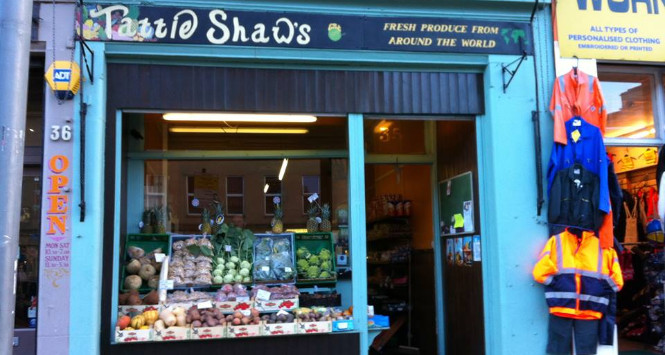With Brexit negotiations between the EU and UK government appearing to be making very slow progress, the British Retail Consortium has published an important document calling for the rights of retail workers and consumers to be prioritised as part of the negotiations.
by Antony Begley
Few topics arouse heated debate quite like Brexit, not least in Scotland where all 32 Council areas voted to ‘Remain’. It is hard to believe that the Referendum took place on June 23 last year, coming up for 18 months ago now, yet in that time very little progress appears to have been made on the details of how Brexit is to be executed. Indeed, the picture looks to many to be murkier than it has ever been – and this lack of clarity is causing consternation among many in the retailing industry.
One of the few retail industry bodies to be tackling the issue head-on is the British Retail Consortium (BRC), which has published several highly-detailed documents on the topic, making solid recommendations to the UK government as it locks horns with the EU over what is becoming an increasingly fractious divorce settlement.
David Lonsdale, Director of the Scottish Retail Consortium, comments: “Six months after the triggering of Article 50 it’s hard to believe we still lack total clarity over the future of the 10,000 EU nationals currently working in the Scottish retail industry. Those workers deserve better.
“In stores, head offices, and logistics, EU workers make an enormous positive contribution to the choice, price and availability of goods available to Scottish shoppers. We want to see early certainty about their future working status in the UK for their sake, but also as it could ultimately affect the choice and availability of goods that Scottish customers have come to expect.
“We also need to ensure that Scotland’s future retail workforce has the people, skills and resources to continue meeting the needs of consumers and grow the industry’s huge contribution to the Scottish economy. That’s why we want to see a more ambitious approach from the Scottish Government towards the apprenticeship levy. From April Scots retailers started paying £12m a year in levy fees, but it is far from clear what they are getting in return for this significant extra tax.”
What is settled status?
Settled status is a new immigration status that the UK Government has proposed to the EU as part of the exit negotiations. It is expected to be very similar to Indefinite Leave to Remain granted to non-EEA nationals after five years of continuous residence in the UK. Any disputes relating to settled status would be dealt with by the UK courts.
What is Permanent Residence?
Permanent Residence can be acquired by EEA nationals who spent five continuous years living in the UK. Permanent residence provides an ongoing right to be joined in the UK by eligible non-EEA family members without meeting the rigorous financial criteria applied to non-EEA spouses and partners of UK citizens.
What is a temporary worker?
A worker engaged in work for period of up to nine months. Temporary workers can often go on to become permanent employees and work in a number of different roles.
What is a seasonal worker?
A worker employed over a particular period of the year, often covering summer and Christmas peaks.
What is non-graduate labour?
Non-graduate labour refers to any individual looking to work who does not have a degree or equivalent NQF Level 6 qualification. Within the Points Based System for Non-EEA Nationals entering the UK to work under a Tier 2 (skilled worker) visa must meet both a salary threshold and a skills threshold. The current salary threshold is £30,000 p/a and the skills threshold is Level 6 (degree level).
What is the current system for non-EU immigration?
The non-EU immigration system for the UK operates as a points-based five-tier visa category system. Applicants must score a minimum number of points on an assessment test to be eligible for one of the five different visas. The test takes into consideration factors such as age, fluency in the English language, and other factors dependent on the specific tier under which you apply:
- Tier 1, High-skilled workers
- Tier 2, Skilled workers
- Tier 3, Low-skilled workers
- Tier 4, Adult students
- Tier 5, Temporary workers
A different number of points is needed for each of the five tiers.
The latest BRC report, The People Roadmap, focuses squarely as the title suggests on people – those behind the counter as well as those in front of it: “From distribution to stores and in head office roles, EU colleagues in retail contribute enormously to the choice, price and availability of goods available to shoppers. A lack of certainty about the future status of EU colleagues and the UK’s future relationship with the EU is driving workforce changes that have the potential to impact consumer choice and experience.”
The report is the third in a series, following The Tariff Roadmap, which detailed why the BRC believes we need a tariff-free deal with the EU to avoid increasing prices, and The Customs Roadmap which set out the challenges the Government faces in delivering frictionless trade and the steps that must be taken to safeguard a sustainable future for Scottish and UK retail businesses.
In The People Roadmap, the BRC focuses on the people issues of Brexit. Drawing on fresh data gathered from members, this research document considers the role of EU colleagues in both the retail workforce and their supply chains and presents the key steps it believes necessary to provide certainty for EU colleagues now and to ensure the UK’s future immigration system meets the needs of the retail industry and its customers.
The report rightly points out that the retail industry is going through a period of transformational change that is directly affecting the size and the skills profile of the workforce. BRC estimates that the number of jobs in retail will fall over time but the roles that remain will become more highly skilled.
Seeking positives, the report suggests that Brexit could present an opportunity to design a new, sustainable immigration system that recognises the changing nature of retail and has the confidence of the general public.
But to make that happen, we need to design a system that recognises the workforce needs of the industry, at all skill levels, while at the same time working in partnership with industry to equip the domestic labour market with the skills of the future.
Or, as the report phrases it: “Our aim is to ensure our world-leading retail industry has the people, skills and resources to continue meeting the needs of consumers as well as also grow its huge contribution to the UK economy.”
The importance of EU colleagues
While the overall share of EU colleagues in the retail workforce is smaller than other industries such as hospitality and care, a detailed look at where EU colleagues are working within retail organisations and their supply chains clearly shows that certain geographies and retail functions will feel the impacts of the end of freedom of movement more strongly than others.
EU nationals are also critical to the ensuring the nation is fed. The food and drink supply chain represents 13.2% of UK employment and around a third of those individuals are from the EU. Without the right systems in place for retailers and their supply chains, when the UK leaves the EU consumers could be left with less choice and higher prices.
According to the Office of National Statistics, around 170,000 EU nationals work in the UK retail industry while around 4% of head office staff are EU nationals. In Scotland, around 4% of the retail workforce are EU nationals – a small but significant minority.
Affordable choice and quality
The report argues that maintaining the choice and availability of affordable, quality products for consumers is at the centre of achieving a fair Brexit for consumers – and the retail workforce, and the workforce across supply chains, are critical to achieving this.
“Since the vote to leave the EU in June 2016, uncertainty has been rife among the workforce and the latest immigration figures demonstrate that EU nationals, unsure about their future status in the UK, are voting with their feet,” states the report.
A BRC Workforce Survey from this year suggests that some 56% of retailers say that their EU staff are concerned about their right to remain in the UK.
The impact on the availability of workers and the cost of employment could thus be felt by consumers unless the retail industry perspective is recognised as the Government focuses on the post-Brexit labour market.
Status a priority
To confront this issue, the BRC is calling on the UK government to provide certainty for EU colleagues by having their status confirmed as a priority.
“The UK’s offer of settled status in June was welcome, but the UK Government must go further in outlining what the process for acquiring settled status looks like and provide greater clarity about when the cut-off date is, confirming it will not be retrospective,” says the report.
Many individuals have already gone through the process of acquiring permanent residence under EU law. For these individuals, an automatic transition to settled status must be put in place, says the BRC. The price for acquiring settled status must also be set a reasonable rate to ensure that all individuals can access it.
Right people, right time
The second major set of demands from the BRC in its The People Roadmap report centres around the varying skill levels of EU staff employed in the UK retail industry.
EU colleagues clearly work across the retail industry in roles that require different levels of skill. As the employment rate increases, the labour market tightens and the ability to recruit at all skill levels becomes harder. Retailers are increasingly reporting shortages of highly skilled roles.
A huge 83% of retailers employ EU nationals in unskilled work, while a much lower 39% employ highly-skilled labour (requiring a degree or professional qualification).
In the short term, says the report, it is essential that the UK’s new immigration system provides access to non-graduate labour to ensure the retail industry can continue to meet consumer demand. Over time, as jobs in retail evolve and become more skilled, employers and the Government must work together to provide the right skills for the industry. The UK’s new immigration system must complement the domestic skills base.
Managing growing costs
Consumers have already felt the impact of the referendum, through price increases on the goods they buy, as sterling depreciation makes imported goods more expensive. Prices for both food and non-food items have already been affected by the depreciation of sterling following the vote to leave the EU.
To date, retailers have worked hard not to pass on additional costs associated with employment to consumers. But as government interventions such as the Apprenticeship Levy and the National Living Wage continue to increase the cost of employment, retailers have indicated they will find it harder to avoid passing on future costs.
Greater competition for workers because of inadequate provisions following Brexit would only add to that growing employment bill. Similarly, an onerous and expensive system of sponsorship of EU nationals in the future would further add to the cost base of retailers.
BRC is recommending a simple demand-led system that does not require employer sponsorship.
The report also highlights the critical need for the ability to move across borders swiftly without the need for visas; many retail businesses in Scotland require to visit the EU in a professional capacity with the minimum of fuss for a multitude of reasons.
Again, the report advises taking a pragmatic approach to Brexit by viewing it as an opportunity to ensure a new immigration system rationalises the interplay between the immigration rules and employment law. The current immigration rules for non-EU nationals are often incompatible with UK employment law and employment practices, leaving retailers vulnerable to legal recourse or a loss of their sponsor licence. As the UK Government embarks upon designing a new immigration system for EU nationals, ensuring the two sets of regulations are compatible is essential. The Government should also look to review the immigration rules for non-EU nationals, says the report.
The BRC has made the following recommendations to the UK government to help the retail industry successfully navigate its way through the complex years to come:
Delivering certainty now
- A simple and accessible system for securing settled status.
- Align the date for acquiring settled status to the date the UK formally leaves the EU.
- Automatic transition to settled status for those who have already acquired permanent residence under EU law.
A system for the future
- A simple, demand-led system that does not require employer sponsorship.
- Access to non-graduate labour from the EU.
- Effective integration between the new immigration system and UK employment law.
- Cross-border mobility throughout Europe for business travel without the need for work permits or visas.
- A parallel focus on skills development for the domestic labour force.







